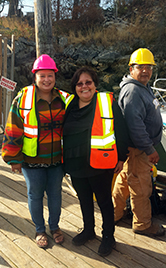 Archeaology sites fall within the purview of the Province and are regulated under the Heritage Conservation Act. The Act endeavours to balance the protection of cultural resources and sacred sites with the rights of private land owners. Strictly speaking, local government does not have the authority to make decisions that are contrary to the Act, but can get caught in the middle of a conflict between the landowner and First Nations, when a site has been approved for development by the Province, but First Nations do not agree with the decision. This tension played out on Grace Islet in Ganges Harbour, Salt Spring Island in 2014 to 2015. The CRD was honoured to play a role in overseeing the demolition of the partially built home on the islet and the subsequent restoration of the sacred site, in partnership with 10 First Nations, the Province of BC and Nature Conservancy Canada.
Archeaology sites fall within the purview of the Province and are regulated under the Heritage Conservation Act. The Act endeavours to balance the protection of cultural resources and sacred sites with the rights of private land owners. Strictly speaking, local government does not have the authority to make decisions that are contrary to the Act, but can get caught in the middle of a conflict between the landowner and First Nations, when a site has been approved for development by the Province, but First Nations do not agree with the decision. This tension played out on Grace Islet in Ganges Harbour, Salt Spring Island in 2014 to 2015. The CRD was honoured to play a role in overseeing the demolition of the partially built home on the islet and the subsequent restoration of the sacred site, in partnership with 10 First Nations, the Province of BC and Nature Conservancy Canada.
The CRD acknowledges and respects the ancestors of these lands and is working to establish protocols with spiritual elders relating to identification, protection, and in the event of disturbance, respectful re-interment.
Throughout the deconstruction process, the CRD gained a greater understanding of indigenous cultural laws and has brought those teachings into our respective operations. Although the Heritage Conservation Act remains the overarching authority regarding archaeological sites, there is a role local government can play in establishing communication protocols with spiritual advisors to ensure the ancestors are cared for, and referral protocols with First Nations monitors when undertaking earth moving activities.
In 2020, the CRD implemented the Protection and Conservation of Heritage Sites Policy to facilitate the protection of heritage and archaeological sites within the CRD in compliance with provincial legislation, and to reduce potential harms to Indigenous communities which might result in damage to their heritage sites. The policy endeavours to balance conservation goals with project costs and timelines, and provides instructions to CRD staff regarding evaluation and management of project impacts to heritage sites.